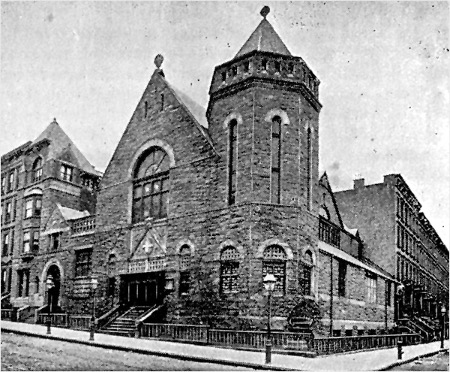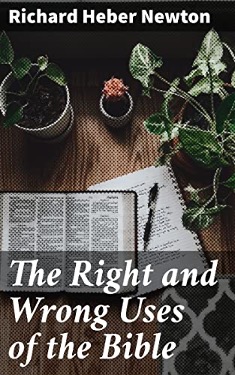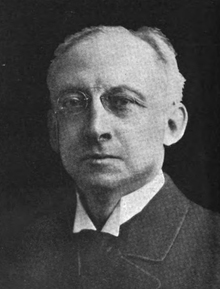Episcopal preacher and author garners following—and controversy.
Rev. R. Heber Newton (1840-1914)
Mary Elizabeth Lewis Newton (1840-1913)
The Rev. R. Heber Newton was rector and preacher at All Souls Protestant Episcopal Church in Manhattan from 1869 to 1902. But he was also a prolific and controversial writer on theological subjects, and a leader of Social Gospel, a progressive movement that applied Christian ethics to social issues, such as poverty, crime, addiction, racial tensions, pollution, and child labor.
The New-York Tribune, Horace Greeley’s “penny paper,” called him “one of the most celebrated clergymen who ever occupied a New York pulpit.”
He also was accused—and later absolved—of heresy, for his sermons delivered on “The Right and Wrong Uses of the Bible.”
Richard Heber Newton was born October 31, 1840, the son of Lydia and the Rev. Richard Newton, an eloquent preacher, author, and long-time pastor of St. Paul’s Protestant Episcopal Church in Philadelphia. The elder Rev. Newton also edited Sunday School World, a weekly publication for children filled with images and stories from the Bible and distributed worldwide.
In 1862, R. Heber graduated from the University of Pennsylvania, then studied at the Episcopal Divinity School. He was ordained a deacon in 1864 and a priest in 1866. While a deacon, he served four years as an assistant to his father at St. Paul’s, then was assigned to Trinity Church in Sharon Springs, New York. He married Mary Elizabeth Lewis on April 14,1864, in Philadelphia. They had a daughter, Elizabeth, and three sons, Richard Jr., F. Maurice, and Frances.

In the spring of 1869, the family moved to New York, and R. Heber took charge of All Souls, practically a new parish, where he became one of the most talked-about clergymen in the country because of his radical and liberal views.
During his decades as a pastor, R. Heber wrote dozens of theological works. But it was a series of sermons on his interpretation of the Scriptures that landed him in trouble with the Episcopal hierarchy.
In 1891, he was formally charged by three senior Episcopal clergymen of entertaining “liberal religious views and violating Canon XIII in admitting other denominations to his pulpit.”
One of several charges accused R. Heber of “affirming that the Bible is not the word of God, but only contains it,” a position in direct conflict with the church’s teachings. A second charge was that he “taught a doctrine subversive of the supremacy of the Holy Scriptures,” including virtually denying the divinity of Christ and “his incarnation by the Holy Ghost of the Virgin Mary.”

After much discussion, the bishop laid the charges aside for a year before finally dismissing them, but he also asked R. Heber to discontinue that series of sermons. He did, but they were printed in book form under the same title, The Right and Wrong Uses of the Bible. It was a best-seller; copies and reprints are still available.
So popular and powerful were R. Heber’s Sunday sermons that The New York Times printed many of them. And when he was taken ill with “the grip,” as the flu was called, on Christmas Eve 1891, The Times published several stories on his treatments and condition, including updates on whether he would be preaching the following Sunday.
In 1902, R. Heber stepped down from the pulpit at All Souls, and the Newtons moved to California, where he served briefly as pastor of Stanford Memorial Church at Stanford University. He later said the reason he retired was the severe criticism he received for trying “to harmonize the differences in creeds.”
While out West, the New-York Tribune reported, he devoted much of his time to psychic research and mind reading. In 1905, he addressed the American Institute for Scientific Research, saying he believed in spiritualism—communicating with spirits of the dead.
Mary Elizabeth Newton died December 8, 1913, at home in Scarborough, New York. The Rev. R. Heber Newton died a year later, at age 74. In 1915, Knickerbocker Press published a 79-page memorial book, A Service to Honor the Memory of the Rev. R. Heber Newton, D.D., and to Help Perpetuate the Ideals to Which His Life Was Dedicated.
The fund honoring the Newtons came to The Trust through the estate of their daughter, Elizabeth Newton Bosworth. Grants from the fund have supported nonprofits such as CAMBA, Facing History and Ourselves National Foundation, and Arab-American Family Support Center.
A sampling of books by the Rev. H. Heber Newton. Many have been reprinted and are still available.
The Children’s Church: A service book and hymnal for use in the Sunday-school and church (1872)
The Morals of Trade (1876)
Studies of Jesus (1880)
Womanhood: Lectures on a woman’s work in the world (1881)
The Right and Wrong Uses of the Bible (1883)
Philistinism: Plain words concerning certain forms of modern scepticism* (1885)
The Present Aspect of the Labor Problem (1886)
Social Studies (1887)
Church and Creed (1891)
Sermons in All Souls’ Monthly, 1888-1891 (1891)
Christian Science: The truths of spiritual healing and their contribution to the growth of orthodoxy (1898)
Parsifal: An ethical and spiritual interpretation (1913)
The Influence of the East on Religion (1913)
The Mysticism of Music (1915)
Catholicity: A Treatise on the Unity of Religions (1918)
The Book of the Beginnings: A study of Genesis with a general introduction to the study of the Pentateuch** (1923)
*This is the way it was spelled
** The first five books of the Hebrew Bible (Genesis, Exodus, Leviticus, Numbers, and Deuteronomy). Traditionally ascribed to Moses, it is now held by scholars to be a compilation from texts of the 9th to 5th centuries BC.
